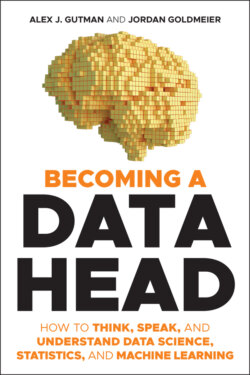Читать книгу Becoming a Data Head - Alex J. Gutman - Страница 22
The Boardroom Scene
ОглавлениеFans of science fiction and adventure movies know this scene all too well: The hero is faced with a seemingly unsurmountable task and the world's leaders and scientists are brought together to discuss the situation. One scientist, the nerdiest among the group, proposes an idea dropping esoteric jargon before the general barks, “Speak English!” At this point, the viewer receives some exposition that explains what was meant. The idea of this plot point is to translate what is otherwise mission-critical information into something not just our hero—but the viewer—can understand.
We've discussed this movie trope often in our roles as researchers for the federal government. Why? Because it never seemed to unfold this way. In fact, what we saw early in our careers was often the opposite of this movie moment.
We presented our work to blank stares, listless head nodding, and occasional heavy eyelids. We watched as confused audiences seemed to receive what we were saying without question. They were either impressed by how smart we seemed or bored because they didn't get it. No one demanded we repeat what was said in a language everyone could understand. We saw something unfold that was dramatically different. It often unfolded like this:
Us: “Based on our supervised learning analysis of the binary response variable using multiple logistic regression, we found an out-of-sample performance of 0.76 specificity and several statistically significant independent variables using alpha equal to 0.05.”
Business Professional: *awkward silence*
Us: “Does that make sense?”
Business Professional: *more silence*
Us: “Any questions?”
Business Professional: “No questions at the moment.”
Business Professional's internal monologue: “What the hell are they talking about?”
If you watched this unfold in a movie, you might think wait, let's rewind, perhaps I forgot something. But in real life, where choices are truly mission critical, this rarely happens. We don't rewind. We don't ask for clarification.
In hindsight, our presentations were too technical. Part of the reason was pure stubbornness—before the mortgage crisis, as we learned, technical details were oversimplified; analysts were brought in to tell decision makers what they wanted to hear—and we were not going to play that game. Our audiences would listen to us.
But we overcorrected. Audiences couldn't think critically about our work because they didn't understand what we said.
We thought to ourselves there's got to be a better way. We wanted to make a difference with our work. So we started practicing explaining complex statistical concepts to each other and to other audiences. And we started researching what others thought about our explanations.
We discovered a middle ground between data workers and business professionals where honest discussions about data can take place without being too technical or too simplified. It involves both sides thinking more critically about data problems, large or small. That's what this book is about.
